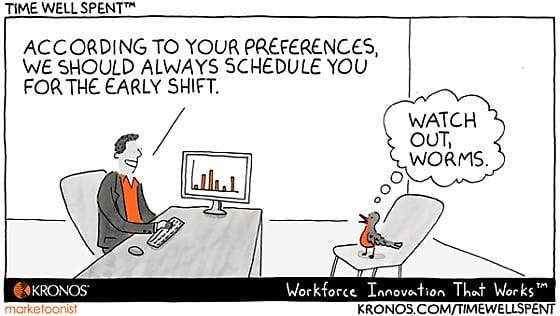(Editor’s Note: Today’s post is brought to you by our friends at Kronos, a leading provider of workforce management and human capital management cloud solutions. Kronos was recently awarded a When Work Works distinction by the Society for Human Resource Management (SHRM) for their workplace wellbeing initiatives. Congrats! Enjoy the post.)
I was chatting with a colleague the other day about working styles. We were talking about being “morning” or “evening” people. For example, I’m a morning person. That doesn’t mean that I don’t ever work in the evening, but I try to plan my night work carefully. There are work related activities that I definitely enjoy a little more later in the day.
IMHO, that’s the point of today’s Time Well Spent from our friends at Kronos. For employee engagement and to be happy at work, they should be able to have some flexibility over their schedule. Self-professed “morning” people (like me) should be able to work the early shifts and “evening” people can be scheduled later in the day.
Now, I do understand that some businesses can’t always do that. The operation demands employees to be there at specific times to take care of customers. But are there times when it makes sense to find out employee preferences and attempt to accommodate them?
During the recruiting process, organizations can let employees know about operating hours, peak times, slow times, and scheduling. If the business has rules they need to follow, tell employees on the front end versus making them find out after they’re hired.
When special projects or a big deadline are approaching, companies could consider asking for volunteers to come in early, stay late, or work on their days off. Granted, there might be times when the company needs an individual’s unique skill…but many times, if asked, the employee will try to make it work.
Organizations need to accommodate changes when emergencies or life changes occur. Two circumstances that immediately come to mind are parents and caregivers. They might need to make adjustments in their schedule.
Employee scheduling might not sound like a big deal, but for engagement it is. If companies want to engage and retain talent, they need to make a conscious effort to work with employees on producing good work schedules. This doesn’t mean employees will always get the schedule they want. But I believe employees know that. It’s all about working together to create a win-win.
12








[…] In my experience, most employees make time off requests because they have a reason. It could be a child’s event at their school or a family celebration or maybe a doctor’s appointment. The point being when employees ask for time off, it’s important to them. And waiting for an approval can be distracting. […]